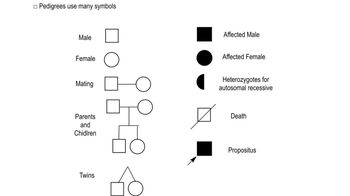- 1. Introduction to Genetics51m
- 2. Mendel's Laws of Inheritance3h 37m
- 3. Extensions to Mendelian Inheritance2h 41m
- 4. Genetic Mapping and Linkage2h 28m
- 5. Genetics of Bacteria and Viruses1h 21m
- 6. Chromosomal Variation1h 48m
- 7. DNA and Chromosome Structure56m
- 8. DNA Replication1h 10m
- 9. Mitosis and Meiosis1h 34m
- 10. Transcription1h 0m
- 11. Translation58m
- 12. Gene Regulation in Prokaryotes1h 19m
- 13. Gene Regulation in Eukaryotes44m
- 14. Genetic Control of Development44m
- 15. Genomes and Genomics1h 50m
- 16. Transposable Elements47m
- 17. Mutation, Repair, and Recombination1h 6m
- 18. Molecular Genetic Tools19m
- 19. Cancer Genetics29m
- 20. Quantitative Genetics1h 26m
- 21. Population Genetics50m
- 22. Evolutionary Genetics29m
For a number of human hereditary conditions, genetic testing is available to identify heterozygous carriers. Some heterozygous carrier testing programs are community-based, often as part of an organized effort targeting specific populations in which a disease and carriers of a disease are relatively frequent. For example, carrier genetic testing programs for Tay–Sachs disease target Ashkenazi Jewish populations and sickle cell disease carrier testing programs target African American populations. The testing is usually free or available at minimal cost, the wait time for results is short, and the results are confidential and unavailable to third parties such as insurance companies. Neither the Tay–Sachs nor the sickle cell allele produces serious consequences for heterozygous carriers.
In a broader sense, what is the value of a community-based effort targeting specific populations for selected diseases?
 Verified Solution
Verified SolutionVideo transcript

 2:48m
2:48mWatch next
Master Pedigree Symbols with a bite sized video explanation from Kylia Goodner
Start learning




